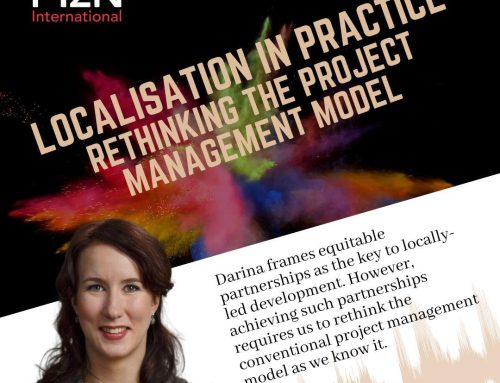Commercial contracts are a real source of income for many NGOs, yet they also remain a major challenge. Pursuing these opportunities is often viewed with scepticism relating to the impact on an organisation’s nonprofit mandate- its soul.
Many of these fears are justified, but they should not tempt us to ignore the alternative operating basis that commercial contracts represent. Managed correctly, these contracts can help overcome some of the formidable challenges many NGOs face today: falling grant income, the end of unrestricted partnership grants from the United Kingdom’s DFID, more competition among NGOs, new entrants to the sector and an increasingly challenged or shrinking civic space in some countries.
Attracting and successfully winning commercial contracts is also littered with potential tripwires. Together with my colleagues at MzN International, we have been privileged to help several major international NGOs get “commercial contract ready”. Here are the top five tips we have learned.
1. Get ready and get serious
For a commercial contracting strategy to work, an NGO needs to address any concerns up front. These could include whether the organisation is set up for commercial contracts, or the impact that service contract work could have on the NGO’s values.
In our experience, a commercial contract strategy works well when it hits the sweet -spot between commercial viability and programmatic fit. Hence, the contract is just another way for the NGO to serve its mandate and earn unrestricted funding along the way.
Defining and developing a realistic plan to find this sweet -spot will improve the project experience once a contract has been secured. This investment is worth it, even though it may increase the time and costs of preparation.
NGOs often compete directly with project management and consulting firms that are specifically built to bid, win and implement projects. NGOs do not need to mirror a company, but can still add the capacity, systems and processes needed to complement their existing practice. Commercial contracting can become just one more leg supporting the NGO to implement its mandate.
2. Be prepared to make a fast decision
Commercial contracts often work on a tight timeline: The time for proposals is frequently no more than four weeks. This means NGOs need to be able to make a rapid go or no-go decision, often before the official tender announcement.
Some NGOs struggle with this. They sometimes face an administrative burden to convince the office whose donor this contract would be with, e.g. DFID for the U.K, or GIZ in the case of Germany. This process needs to be streamlined in order to allow for this decision to be made within a few days, and not weeks.
3. Get used to a new way of thinking about budget
NGOs usually work with a capped cost budget plus a management fee – usually seven to ten percent – both set by the donor.
Commercial contracts do not usually come with a predetermined price tag. Bidders need to put the most innovative, cost-effective and relevant cost structure in place to suit the projects. This might be a cost- plus fixed fee, an all-in price structure or a mixture thereof. Payments by Results is another potential challenge that needs to be understood and its risks mitigated.
Developing a programme with a competitive and reasonable budget requires a change in thinking and detailed knowledge about the organisation’s own cost base. Capacity building can help ensure that NGO staff are prepared to operate comfortably in this new way.
4. Build alliances from the get-go
Rarely in a large commercial contract does the lead agency – whether an NGO or a firm – implement a project alone. Alliances, subcontracting and consortia are the norm. Like in the grant world, it is critical that these alliances function properly, beginning with proposal submission. If partners do not perform, the entire consortium may risk not getting paid.
NGOs are very accustomed to working “through partners”. In a commercial contract, they need to ensure that this cooperation works even better, even before the bid is put together. While not a big change to current thinking, this is critical.
5. Rethink project management
Managing a commercial contract to the required service level is different from managing a grant programme. Requirements for administration, reporting and management are often onerous. The donor agency becomes less of a partner and more of a client, expecting excellent customer service to satisfy taxpayer demands.
In principle, this is not too different from many grant contracts, but it becomes far more essential in a commercial contract. To build long term success, a new project management mindset is required.
Go for it!
Commercial contracting opportunities far exceed grant allocations. This in itself, however, is not a sufficient reason to start bidding. The ultimate reason why this type of contract cannot be ignored is a moral one: If NGOs fail to adapt, then there is a real risk of the development and aid sector becoming too commercial.
By nature, commercial contracts prefer achievable projects in which risk is manageable, and the likelihood of being fully paid is very high. In this world, marginalised or difficult to reach communities could receive even less help. A commercially capable organisation that remains an NGO at heart will make a huge difference here.
Christian Meyer zu Natrup
Managing Director of MzN International
This article was originally published by Devex
(https://www.devex.com/news/opinion-5-tips-for-ngos-aiming-at-commercial-contracts-90114)





